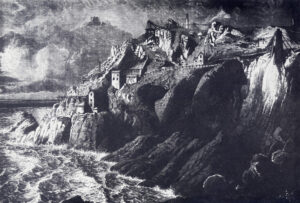 Botallack Mine – an engraving
Botallack Mine – an engraving
This poem is from an anonymous elderly lady down St Just way who was clearing out her late parents’ papers so it likely dates from the 19th century and, because of the use of the present tense, maybe from the time of the disaster. We are indebted to Paul Phillips who sent it to Cornish Story with the comment, “It’s a poem for all miners who had their lives taken away and for whom a mark of respect is due.”
In Cornwall on the western coast, St Just down near Land’s End,
Botallack mine, a wondrous place, upon the cliffs is found,
Near half a mile beneath the sea men labour day and night:
They search for tin and copper ore by candle’s glimmering light.
Their pathway down the gloomy shaft four hundred fathoms deep,
is cut through adamantine rocks all rugged deep and steep.
A skip or gig goes up and down with all its living freight
of miners sent to work below and back when ‘tis complete.
By engine power it’s drawn to grass and by the same let down
on iron rails made sure and firm as if on solid ground.
On Saturday at three o’clock on April’s eighteenth day
nine miners were being drawn back up that dark and lonesome way.
On, on they came and neared the top, none dreamed of danger nigh.
When suddenly the chain was broke and back the skip did fly.
No power could stay its rapid course, down, down the dark abyss,
One hundred miles an hour it ran, a fearful speed was this.
And those within the fatal skip, that deadly car of death
were in the twinkling of an eye deprived of mortal breath.
Down, down it went with fearful crash its living freight was lost.
It filled the shaft with sparks of fire and sickening clouds of dust.
And back within the engine house, their tokens could be seen.
That something serious had occurred what could that rumbling mean?
Alarm bells rang and panic spread and soon the rescuers came.
Brave-hearted men but ah, too late, too late to save life’s flame.
Down in the gloomy depths below they hastened for to see
if any living could be found or those with injury.
But there a fearful scene they viewed, nine human bodies lay,
wrapped in the cold embrace of death, a scene of great dismay.
Richard Nankervis first they found, a lad and he was dead,
a blow had killed him on the spot that struck him on the head.
John Eddy next, a ghastly corpse upon the road was found
his arm and all so badly crushed, his head smashed on the ground.
Beneath the skip John Chappel lay, a steady quiet man
and by his side his eldest son, so shocking to look upon.
Young Peter Eddy’s head was gone and on the skip he lay.
The solar struck him as they passed and took his head away.
Yet further down were others found: Thomas and Richard Wall,
father and son – an awful sight – lay in that dreadful hole.
Thomas Nankervis lay in death an awful sight to view,
and Michael Nicholas by his side both bruised and mangled too.
Each one was injured fearfully, bruised, broken, smashed and dead,
a sickening spectacle for some had lost their head.
The horrid news soon spread around and thousands gathered there,
friends and relations in the crowd with cries that rend the air.
At length the bodies were brought up and borne unto their homes
where loving wives and children dear, with mingled cries and groans.
Near twenty children now are left without a father’s care.
Three widows for their husbands mourn in sorrow and despair.
The widowed mother too is left, her only son is gone:
his earnings did for her provide, nought else to live upon.
On Sunday in each House of God, dry eyes could scarce be seen,
the preachers spoke of the event while sobs did intervene.
They spoke of humble, pious men whose fate they did deplore,
who lately joined with them in praise, to him they did adore.
That although suddenly cut off, they long had been prepared,
their lives were full of holiness, their God they’d always feared.
How blessed are they who die in Jesus sanctified,
whose only hope is in the Lord, who for them bled and died.
And these still living here below, prepare for that sad hour
by seeking pardon for their sins, through the Holy Spirit’s power.
They trusted in the living God, they feared not yet to die:
but living or dying all was well, with Jesus ever nigh.
Then borne unto the silent tomb with thousands gathered there,
to mingle with the relatives – sorrow’s lingering tear.
Since life with all uncertainty and death is sure to come,
how should we live – if heaven be gained – to escape eternal doom.
An accident, or sudden death, above or underground,
may call thee, reader, but how blessed if waiting thou art found.
Then mourn not, weeping friends, for they that are now gone,
in heaven they from their labours rest, before the great white throne.
Prepare you now to follow them, while yet it’s called today
lest unprepared, grim death should come, and summon you away.
The story of this disaster can be found here: https://nmrs.org.uk/mines-map/accidents-disasters/cornwall-devon/botallack-tin-mine-accident-cornwall-1863/
(In this context Solars were the platforms on the Man-engine on which the miners stood and from which would step off to either ascend or descend the mine. They were spaced approximately 15 ft apart.)
